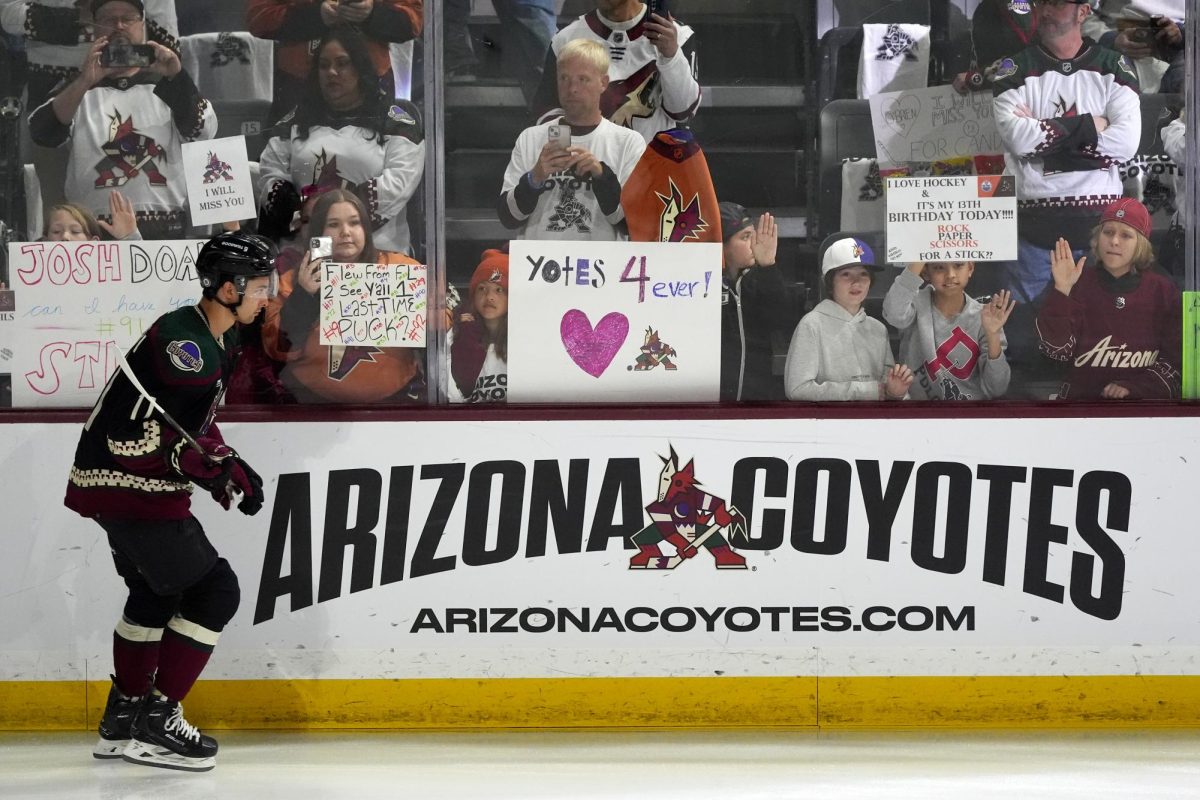The coyote is a legend in Navajo mythology in Arizona. In one story, the coyote causes a flood that nearly destroys the world but forces people to adapt to a chaotic environment. The coyote is a catalyst for change, a reminder that the world is unpredictable.
Like the coyote of legend, the Arizona Coyotes created chaos for their fans. Less than three decades after the NHL moved the team from Winnipeg to Phoenix to become the Arizona Coyotes, financial mismanagement led them away to Salt Lake City.
After 27 years in the Grand Canyon state, the Coyotes were sold to Ryan Smith, the owner of the Utah Jazz, for $1.2 billion, four times their value from just five years earlier, according to ESPN — a staggering profit that reflected changing priorities in sports.
The decision to move to Salt Lake City wasn’t just a financial calculation – it was a sign of the times. In today’s sports world, loyalty is traded for profit, and cities become temporary homes, valued for only what they can offer the bottom line. It’s a reminder that, like the coyote, the forces of change are indifferent to the people left behind.
Team relocations aren’t uncommon in the NHL. Since 1993, twice as many teams have relocated than won back-to-back Stanley Cups — including the Coyotes moving twice. All the moves have been for some financial reason, so why does this keep happening?
It’s hard to blame the team for failing financially when they were never put in a position to succeed. It’s challenging to market a game played on ice to people living in a city with an average July high of 106 degrees.
But the lack of success isn’t just due to the unfavorable environment. Plenty of hockey teams have succeeded in the Southern heat, with three of the last five Stanley Cups going to teams hailing from Florida. Instead, the failure was from the team’s desire to drive up their profits.
In 2021, the Coyotes were evicted from their home arena in Glendale due to unpaid bills, forcing them to play their home games at Arizona State University in Tempe. The rink only had a capacity of 5,000 seats, less than a third of the next-smallest NHL arena.
Even when Phoenix couldn’t give the Coyotes the revenue they were looking for, fans still showed up to cheer for the team that spurned them. A team that chose the bottom line over loyalty.
The Coyotes weren’t even operating on a deficit, but they still refused to pay the $1.3 million bill. Their operating income was over $19 million, according to Forbes, but it wasn’t enough for owner Alex Meruelo.
Meruelo ran the team like a business venture, caring more about the balance sheets than hanging banners in the rafters that the team didn’t even own by the time they left.
In the current era of sports, money has become the priority for every team. If a city doesn’t shell out hundreds of millions for a new stadium, teams will flee to the first city that will. Chasing higher revenues has become the only incentive for a sports team to continue to operate.
This isn’t a problem specific to hockey, as Oakland sports fans can attest. The city has lost its NFL and MLB teams to Las Vegas in the last four years. The Raiders and A’s attributed the move to the city’s refusal to build a new stadium to replace the aging Oakland Coliseum.
Las Vegas built the Raiders a shiny new $1.9 billion stadium, leaving behind one of the most passionate fan bases in the league in Oakland.
Even St. Louis lost the Rams just eight years ago. After playing in Missouri for three decades, they ditched the city for the money temptation in Los Angeles.
While the relocation problem isn’t specific to hockey, it is specific to American sports culture. For instance, in Indian Premier League cricket, a team has never relocated from one city to another.
There has only ever been one relocation to a different city among English soccer teams: Wimbledon F.C. moved 56 miles to Milton Keynes. The move prompted a significant backlash among fans. Adam Crozier, the chief executive of the Football Association, said it was an “appalling decision.”
English soccer teams are treated as part of the city, but American sports teams are often ripped away from their city if they can’t turn enough of a profit.
There’s a Navajo saying that says if a coyote crosses your path, turn back and do not continue your journey. This time around, the Coyotes didn’t continue their journey. Lured by the temptation of greater profits in Utah, they left behind a city that once welcomed them, becoming just another casualty in the profit-driven chaos of relocation.


